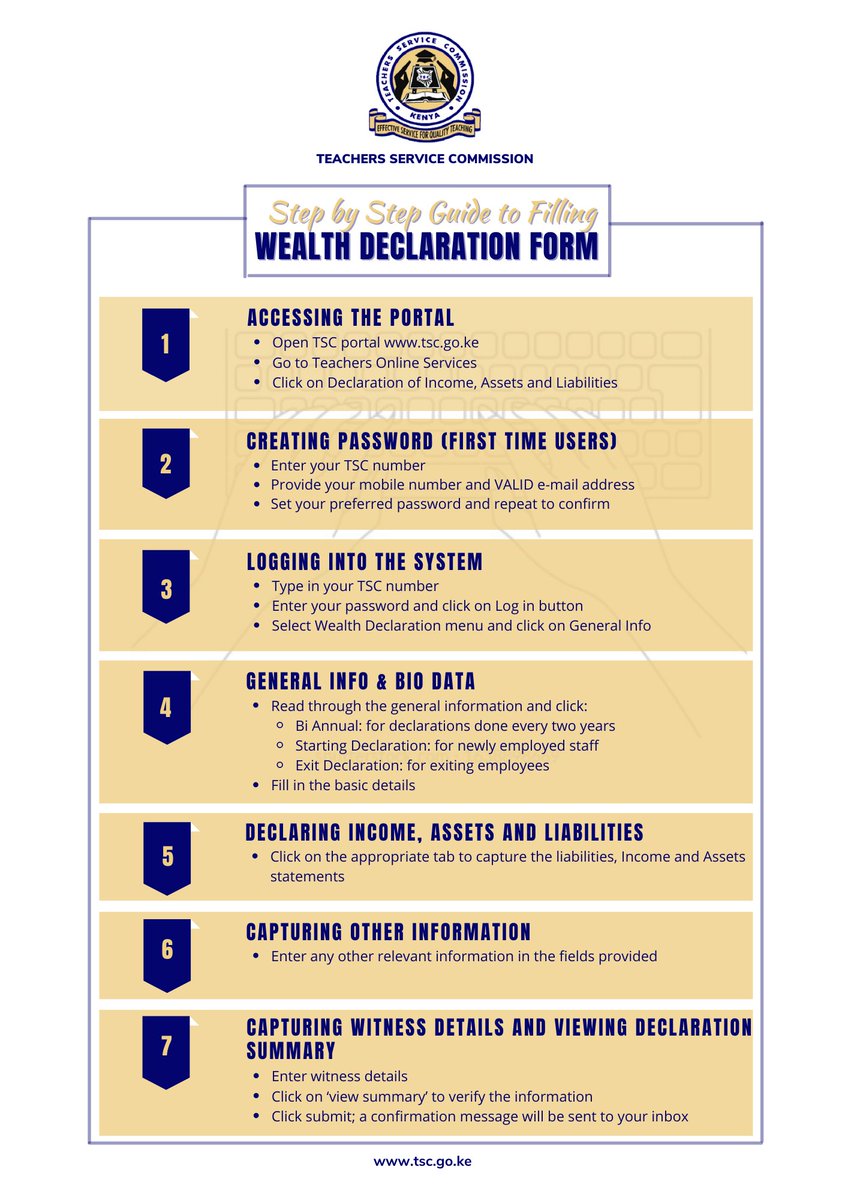The Teachers Service Commission (TSC) has continued to redefine the professional and ethical landscape for educators in Kenya. Over the past few years, the Commission’s instructions and guidelines have evolved, reflecting a broader national agenda of integrity, accountability, and digital transformation in public service. One of the most striking indicators of this change is the new approach to wealth declaration, an exercise that has moved from being a routine formality to becoming a vital aspect of teachers’ ethical and professional responsibility.
From Manual Routine to Digital Accountability
In earlier years, wealth declaration among teachers was largely viewed as a bureaucratic ritual. Teachers filled out forms, often without much guidance or emphasis on verification, and submitted them to their respective heads of institutions. The exercise was paper-based, time-consuming, and rarely audited for accuracy. For many, it felt like an obligation detached from their day-to-day duties.
However, TSC’s recent instructions mark a significant transformation. The Commission has adopted a fully digital wealth declaration platform, integrated into its Human Resource Management Information System (HRMIS). Teachers across the country are now required to declare their assets, liabilities, and income sources online. This shift promotes efficiency, transparency, and data integrity while reducing paperwork and opportunities for manipulation.
Promoting Ethics and Integrity
The transformation is not just technological — it is ethical. TSC’s renewed emphasis on accuracy and honesty in wealth declaration underscores its commitment to integrity in the teaching profession. Teachers are not only expected to disclose their wealth but to do so truthfully and transparently, knowing that false or incomplete information may attract disciplinary or legal consequences.
By enforcing these standards, TSC aligns itself with the broader national anti-corruption framework led by the Ethics and Anti-Corruption Commission (EACC). The message is clear: public officers, including teachers, must lead by example. They are custodians of values and mentors to the next generation, and therefore, their conduct—both inside and outside the classroom—must reflect ethical uprightness.
Guidance, Compliance, and County Success Stories
To ensure full compliance, TSC has issued detailed circulars and online guides explaining the procedure and deadlines for wealth declaration. Teachers are encouraged to update their details regularly, maintain personal financial records, and seek clarification whenever needed. School heads have also been instructed to supervise the process within their institutions and offer support to teachers who face challenges with online systems.
READ ALSO:
Aldai residents defy Court ruling, back Kaimosi University Campus project in Nandi County
The exercise has been meticulously implemented across counties, with notable success stories emerging from various regions. In West Pokot County, the exercise was carried out under the watchful leadership of the County Director, Dr. Esther Musani, and ICT Specialist, Mr. Francis Maruche. Their coordination and technical guidance ensured that teachers complied effectively with the online wealth declaration process.
It was a remarkably successful exercise—one of its kind—marked by high levels of participation, efficiency, and professionalism. The initiative was destined to bring on board about 4,000 teachers drawn from primary, junior secondary, and secondary schools across West Pokot County. Through this inclusive approach, the county demonstrated how technology and teamwork can harmonize professionalism, accountability, and service delivery within the teaching fraternity.
This approach has fostered a culture of responsibility and awareness. Teachers are now more conscious of the importance of financial transparency, not only as a legal requirement but as a professional virtue that enhances public trust.
Challenges of the Digital Platform
While the transition to a digital wealth declaration platform represents a major milestone in efficiency and transparency, it has not been without challenges. Many teachers, particularly those stationed in remote and marginalized areas, have encountered significant difficulties accessing and navigating the system. Poor internet connectivity, inadequate ICT infrastructure, and unreliable power supply have hindered smooth submission of declarations in certain counties.
In addition, digital literacy levels vary widely among teachers. Some educators, especially those nearing retirement, struggle to operate computers or smartphones effectively. This has created a reliance on younger colleagues or ICT officers for assistance, occasionally resulting in delays or errors in submission.
Technical glitches on the TSC portal have also been reported during peak declaration periods, leading to congestion, slow response times, or temporary system downtime. Teachers have often expressed frustration when their logins fail or when the portal does not confirm successful submission immediately.
Moreover, data security concerns remain a key issue. Although TSC has assured users that the online platform is encrypted and secure, some teachers remain uneasy about sharing their personal and financial information online. This calls for continuous awareness and confidence-building to assure educators that their information is handled with strict confidentiality and integrity.
Lastly, the cost of digital access—including internet bundles, device maintenance, and electricity—poses a challenge for teachers working under modest salaries, especially in rural areas.
Despite these hurdles, the Commission’s proactive response—through help desks, ICT training, and support teams at the county and sub-county levels—has helped mitigate most of these challenges, ensuring that every teacher can participate effectively in the digital era of accountability.
Teachers across the country have expressed their gratitude to the Teachers Service Commission for introducing an advanced and reliable digital system for relaying information and facilitating the wealth declaration process. They commended the Commission for deploying skilled officers and ICT experts who offered timely guidance, ensuring a smooth and transparent exercise. The collaborative spirit between TSC officials and teachers has not only enhanced efficiency but also strengthened mutual trust and understanding within the education sector.
A New Culture of Professionalism
Ultimately, this changing phase of TSC’s instruction marks a new era of professionalism in the teaching service. The wealth declaration process now embodies more than compliance—it reflects the moral strength of the teaching community. It reinforces the principle that integrity begins with self-accountability and extends to the learners, communities, and the nation at large.
As teachers continue to adapt to these new standards, they are not only complying with institutional directives but also shaping a more transparent and ethical profession. The TSC’s firm stance on accurate data submission, digital compliance, and ethical responsibility sets a precedent for other public sectors to follow.
Conclusion
The changing phase of TSC’s instruction on wealth declaration is both timely and transformative. It aligns the teaching profession with Kenya’s broader vision of transparent governance and ethical public service. Beyond the technology and regulations, it is a call to personal integrity—a reminder that teachers are the moral compass of society.
In embracing these reforms, the teaching fraternity not only fulfills its legal obligations but also reaffirms its role as a pillar of integrity and accountability in nation-building.
By Hillary Muhalya
You can also follow our social media pages on Twitter: Education News KE and Facebook: Education News Newspaper for timely updates.
>>> Click here to stay up-to-date with trending regional stories
>>> Click here to read more informed opinions on the country’s education landscape






